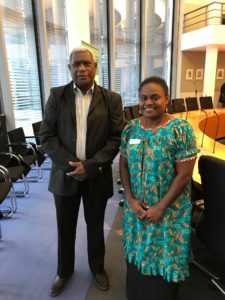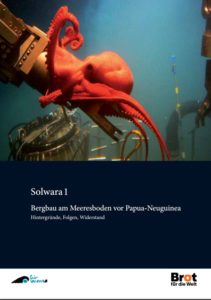LOOKING BACK: NO DEEP SEA MINING! – SPEAKERS TOUR WITH GUESTS FROM PAPUA NEW GUINEA 2018
In Papua New Guinea, the world’s first commercial deep-sea mining project – “Solwara 1” – is about to start: an initial project and door opener for global deep-sea exploitation. Furthermore, the planned mine off the New Ireland’s coast is a symbol of the imperial, destructive and unjust economy of the industrialized countries. In autumn 2018, two of the many protesters in Papua New Guinea visited us for a Speakers Tour through Europe.
“How much more do you want? Is there an end to your endless desire for more?” Christina Tony, campaign coordinator at the Bismarck-Ramu-Group (BRG) and Reverend Roger Joseph, general secretary of the National Council of Churches of Papua New Guinea, asked these questions again and again to their counterparts in eight cities – and thus consciously and deliberately caused inner unrest and anxiety. In the course of their round trip, both of them strongly denounced that the economic and prosperity model of the industrialized countries, their immense hunger for raw materials and their abundance have negative effects on the realities of life of people in other parts of the world – in this case in Oceania. Or, in other words: luxury in the industrialized countries vs. destroyed livelihoods in Papua New Guinea. Christina Tony, the grass-roots activist, and Reverend Roger Joseph, who is chairing the Council of Churches and representing more than six million Christians in Papua New Guinea, made a clear statement: No to experimental deep sea mining, no to “Solwara 1”!
Large quantities of valuable raw materials are stored in the oceans seabed. Industry and politics hope to cover the future demand for raw materials for new and old technologies at a reasonable price. Instead of relying on recycling, sufficiency and sustainability, we are accepting to damage the little explored and unique deep-sea ecology in the long term. Even though regulations for the mining of deep-sea minerals is currently being negotiated internationally on the UN level, there are enormous concerns worldwide that the risk will be taken at all.

Without awaiting this decision on regulations, the Canadian company Nautilus Minerals wants to secure a leading position in the introduction of the new industrial sector in the South Pacific. Already in 2019, the company plans to launch the world’s first commercial deep-sea mining project called Solwara 1 in the waters of the Bismarck Sea off Papua New Guinea. On site, this has led to widespread protests in the affected coastal communities. Negative impacts on the coastal ecosystems and on the fishing grounds are feared, which are indispensable for the nutrition of the population.
During a round trip, representatives of Bread for the World’s partner organisations from the Pacific came to Germany to draw attention to the topic of deep-sea mining and local resistance.
Our guests from Papua Newguinea were:
Christina Tony, campaign coordinator at the Bismarck-Ramu-Group, Papua New Guinea
Rev. Roger Joseph, General secretary National Council of Churches of Papua New Guinea
https://www.oikoumene.org/en/member-churches/pacific/papua-new-guinea/pngcc
The tour which was organized by : Brot für die Welt, Forum Umwelt und Entwicklung, Misereor, fair oceans, PowerShift, BUND, Pazifik-Netzwerk, Stiftung Asienhaus, Heinrich-Böll-Stiftung and Ozeanien-Dialog
Took us and our guests to
Berlin – Kiel – Brussels- Venice- Hamburg – Bremen – Cologne – Frankfurt
 The tour took its prelude with talks with guests from politics, business, science and civil society in Berlin. This included an expert discussion on Deep Sea Mining in the German Federal Parliament, the Presentation of the new Solwara 1 study by Brot für die Welt and fair oceans as well as civil society exchange on the issues of raw materials policy and environmental protection.
The tour took its prelude with talks with guests from politics, business, science and civil society in Berlin. This included an expert discussion on Deep Sea Mining in the German Federal Parliament, the Presentation of the new Solwara 1 study by Brot für die Welt and fair oceans as well as civil society exchange on the issues of raw materials policy and environmental protection.
Thus, the topic of the public expert discussion of the Green parliamentary group on 24.09.18. at the Bundestag were the consequences and current developments of deep-sea mining. Steffi Lemke (Spokeswoman for Nature and Marine Conservation) of the Green Parliamentary Group in the Bundestag and her colleague Claudia Müller, (Spokeswoman for Maritime Economics) invited guests from non-governmental organisations, economy, science and public authorities to conduct the debate in the parliamentary arena as well. Our guests Christina Tony and Reverend Joseph Roger reported on their struggles against experimental deep-sea mining and the Solwara 1 project along the Bismarck Sea.
„If we cannot do it (Deep Sea Mining) safe and sustainable, we will not do it at all“
Johannes Post (Deep Sea Mining Alliance e.V.), 24.09.2018

Bread for the World and fair oceans published their comprehensive study
Solwara 1 – Mining the Seabed off Papua New Guinea. Backgrounds, consequences, resistance as part of the tour.
This new report on the threats of commercial seabed mining in Papua New Guinea highlights the dangers of the project. Science, the local population and international civil society have their say in the study and warn of the consequences. Bread for the World, in cooperation with Fair Oceans and the Forum Environment and Development, invited to a public discussion on 25.09.18 on deep-sea mining as part of their series of events “Im Brennpunkt”, The aforementioned study was launched here.
Discussion partners from the Pacific and Germany discussed the different facets of deep-sea mining and the situation in Papua New Guinea.
Following participants discussed with our Pacific guests
Prof. Dr. Andrea Koschinsky, Professor of Geosciences at the Jacobs University Bremen
Norbert Brackmann, MdB, Federal Government’s coordinator for the Maritime Industry
Michael Jarowinsky, Managing Director of Deep Sea Mining Alliance
Dr. Laura Spengler, Expert for Environmental Policy and Environmentally Compatible Products at the Institute for Politics and Ecology
Francisco Mari, Bread for the World, Maritime Policy and Agricultural Trade Desk

The participation of our Pacific guests at the TBA21 Academy in Venice was the absolute highlight of the Speakers tour. For an art project dealing with the relationship between people and the sea, the artist Armin Linke travelled – among other places – to Papua New Guinea. There he also met Christina Tony and many other activists who oppose experimental deep-sea mining. These voices were given a very special platform by the artistic processing and the contributions of Christina Tony and Rev. Roger during the closing event in Venice.

The visit to Bremen on 2 October began in Bremen’s Marum, the centre for environmental science, one of the world’s leading marine research institutes. Christina Tony, Bismarck Ramu Group, together with representatives of fair oceans, the Oceania-Dialogue and IASS Potsdam took part in a short tour of the Department of Maritime Technologies. After viewing the large marine equipment such as a remote-controlled seabed drilling rig and a diving robot, the group was able to talk to the director of the institute and the head of the maritime technologies division. During the discussion, the involvement of Nautilus Minerals observers in a research trip of the Research Centre to the Bismarck Sea, the Solwara-1 area, and the provision of expedition data to Nautilus were controversially discussed.
Buten und Binnen Bremen, the regional magazine of the Hanseatic city, took up Christina Tony’s visit and interviewed her at the Bremen Überseemuseum about her perspective on deep-sea mining, the protest in Papua New Guinea and her visit to Europe. The interview Mining in the Deep Sea can be found on Youtube (only in German though)
In the afternoon, fair oceans had invited to an open, interdisciplinary expert discussion on deep-sea mining at the Haus der Wissenschaft Bremen, using the palnned Solwara 1 project as an example. The event was very well attended and lively discussions took place. The scientists stressed the importance of effective regulations for future deep-sea mining. It was also suggested to see deep-sea mining as an economic opportunity that could follow fisheries if fish stocks were minimized by unsustainable management. Christina Tony countered that, based on her experience with land mining in Papua New Guinea and the activities to date regarding planned deep-sea mining, hopes for a fair and effective regulation of deep-sea mining would be futile. In addition, there is a great abundance of fish. She also warned against Germany’s greed and never-ending hunger for more and more resources.
In the evening a lecture and discussion event took place in the Bremen Überseemuseum. On the podium were Christina Tony, Kai Kaschinski from fair oceans and two representatives of the Federal Institute for Geosciences and Natural Resources (BGR) in Hanover. Dr. Christoph Speer from fair oceans moderated the event. In two presentations, BGR emphasized the opportunities of deep-sea mining for the safety of raw materials and the diversity of German sources of mineral raw materials.
With further public evening events in Hamburg, together with the Heinrich Böll Foundation Hamburg, in the context of the German Nature Conservation Day (DNT) in Kiel, at the World Cultures Museum Frankfurt am Main and in the Asia House Cologne, where we had a special look at the role of China, we were able raise awareness about the threat of deep-sea mining in Papua New Guinea, give our guests and partners platforms for their important messages, build up solidarity and support our demand – No deep-sea mining in the Pacific!
Christina Tony and Rev. Roger Joseph have made it clear again and again during the Speakers Tour that immediate threats to food security and local development in Papua New Guinea are the reverse of the still almost unchecked consumption of resources in the industrialized countries.
Neither of them can come to terms with this injustice. And with them many communities, non-governmental organisations and churches along the Bismarck Sea and throughout the Pacific.It depends on their loud resistance and creative campaigns whether Solwara 1 and thus the accelerated entry into seabed mining can be stopped. For this they need international support, especially from those countries from which the capital, the technologies and the excessive consumption of resources come. In order to gain support and solidarity from Europe, the Speakers Tour was an important step – more must follow.
Further information:
PNG Council of Churches call for a total ban on Seabed Mining



0 Comments